Zadig or L'Ingenu Read online
Page 2
ZADIG
OR
DESTINY
AN ORIENTAL TALE
IMPRIMATUR
I THE undersigned, who claim to be a scholar, and even a wit, have read this manuscript. I have to admit that I have found it curious, amusing, moral, philosophical, and likely to please even those who hate novels. I have therefore damned it, and have assured the Lord Chief Justice that it is a detestable performance.
EPISTLE DEDICATORY FROM SADI TO THE SULTANA SHERAA
The eighteenth day of the month Schewal, in the year 837 of the Hejira
ENCHANTER of Eyes, Disturber of Hearts, Light of the Mind, I kiss not the dust from your feet, because you rarely walk, or walk only upon Iranian carpets or on roses. I present to you the translation of a book written by a Wise Man of old, whose good fortune it was to have nothing else to do but occupy himself in writing the story of Zadig, a work which has more to tell than meets the eye.
I beg you to read and consider it; for though you are in the springtime of life, though all pleasures are at your command, though you are beautiful, and though your talents enhance your beauty; though you are praised from sunset to sunrise, and therefore by rights you should have no common sense; yet you have a good understanding and a refined taste, and I have heard you argue better than the old Dervishes with their long beards and tasselled caps. You are discreet, yet not distrustful; you are sweet-tempered, without being weak; you discriminate in your charities; you love your friends, and you never make enemies. Your wit never borrows charms from slander; you say no harm and do no harm, though both are so much in your power. In short your soul has always seemed to me as spotless as your beauty. Besides, you possess a little stock of philosophy, which makes me think that this wise man’s work will appeal to you more than to any other lady.
It was written originally in the ancient Chaldean tongue, which neither of us understands. It was then translated into Arabic, to entertain the famous Sultan Oulougbeg, at about the time when the Arabs and the Persians were beginning to write the Thousand and One Nights, and the Thousand and One Days, and so forth. Ouloug preferred reading Zadig; but the Sultanas enjoyed the Arabian Nights much more. ‘How can you prefer stories,’ asked the wise Ouloug, ‘which have neither sense nor reason?’ ‘But that is just why we do like them,’ replied the Sultanas.
I am sure that you will not resemble them, but will prove instead a true Ouloug. I even hope, when you grow tired of general conversation – which is like the Arabian Nights, except that it is less amusing – that I may have the honour of a moment’s rational discourse with you. If you had been Thalestris in the time of Alexander son of Philip, or the Queen of Sheba in the time of Solomon, those would have been the kings who would have visited you.
I implore the Heavenly Powers that your pleasures be unalloyed, your beauty lasting, and your good fortune without end.
SADI
CHAPTER 1
BLIND IN ONE EYE
THERE lived at Babylon in the time of King Moabdar a young man called Zadig, whose amiable character had been improved by a good education. Though he was both rich and young, he knew how to control his passions. He was not in the least pretentious; he did not wish to be always in the right, and he could respect the weakness of his fellow men. Though amply endowed with wit, it was remarkable that he never jeered at the vague, inconsequential, noisy tittle-tattle, the bold slanders, the ignorant assertions, the blatant puns, and the empty noise of words which in Babylon passed for conversation. He had learned from the first book of Zoroaster that self-esteem is a balloon blown up with wind which will let loose a storm when it is punctured. Even more commendable was his attitude to women, for he never pretended to scorn them and never boasted of his conquests. He was openhanded as well, and was never afraid of befriending where he looked for no return, since he followed the precept of Zoroaster: ‘When you feed, feed the dogs also, even though they bite you.’ To all these qualities was added a good measure of wisdom, for he made it his practice to consort with the wise. He had been instructed in the learning of the ancient Chaldees, and understood as much as was known about natural causes at that time; he also knew as much metaphysics as has ever been known, and that is precious little. He was firmly persuaded, in spite of the latest philosophy, that the year consists of three hundred and sixty-five days and a quarter, and that the sun is the centre of the universe; and when the chief mages arrogantly told him that he harboured dangerous opinions, that it was contrary to the national interest to believe that the sun revolved on its own axis, and that there were twelve months in the year, he held his peace and refused to be moved.
As Zadig was wealthy, he had no lack of friends; and as he was also blessed with good health, a pleasing appearance, a sprightly well-governed wit, and a generous heart, he felt assured of happiness. He was engaged to be married to Semira, whose beauty, birth, and fortune made her the best match in Babylon. He felt for her a solid and virtuous attachment, and Semira was passionately devoted to him.
One day shortly before their wedding they were taking a walk near one of the gates of Babylon, under the beautiful palm trees which line the banks of the river Euphrates, when they saw some men approaching them armed with swords and arrows. They were the retainers of young Orcan, the chief minister’s nephew, who had been led to believe by his uncle’s parasites that he could do what he liked. He had neither Zadig’s graces nor his virtues, but he thought he was the better man of the two and was tormented at not being preferred. This fit of jealousy was occasioned by his vanity, and made him think that he loved Semira to distraction. He therefore resolved to kidnap her. While carrying her off, his minions were so brutal as to wound her and to shed the blood of one whose appearance would have softened a Bengal tiger. The heavens were rent with her screams. ‘My dearest,’ she cried, ‘they are tearing me away from the man I most adore.’ She took no heed for her own danger : all she thought of was her dear Zadig. He rushed to her defence with all the ardour which love and valour bestow. With no help but what his two slaves could give, he put the ravishers to flight, and carried Semira home fainting and bleeding. When she opened her eyes, she saw who it was who had rescued her and said:
‘Oh, Zadig! Once I loved you as my future husband. Now I love you as one to whom I owe my honour and my life.’
Never was heart so affected as Semira’s. Never did such charming lips express more tender feelings. Never did words convey such warmth of gratitude or ardour of such unquestionable propriety.
Her injury was slight and she soon recovered; but Zadig had been more seriously hurt. An arrow had struck him close to his eye and had made a deep wound. Semira prayed without ceasing for her lover’s recovery. Night and day the tears streamed from her eyes, as she awaited the moment when Zadig could revel in her glances; but an abscess developed in the wounded eye which caused the gravest concern. A letter was sent to Memphis to summon a celebrated doctor called Hermes, who arrived with a large retinue. He examined the patient, and announced that he would lose his eye; he even predicted the day and hour when this deplorable event would take place.
‘If it had been the right eye’, said he, ‘I could have healed it. But wounds in the left eye are incurable.’
The people of Babylon were sorry about poor Zadig’s fate, but they were greatly impressed by Dr Hermes’s learning. Two days later the abscess burst, and Zadig completely recovered. Hermes thereupon wrote a book in which he proved that Zadig had no business to recover. Zadig did not read a word of it; but as soon as he could go out, he decided to pay a visit to her in whom his future happiness lay, and for whom alone he treasured his sight.
Semira had been in the country for the last three days. He learned on the way to her house that that beautiful lady had openly declared her unconquerable aversion to one-eyed men, and had just married Orcan that very evening. On hearing the news, he fainted. Grief brought him to the very edge of the grave and he suffered a long illness. But in the end, reason triumphed over his affliction, and the
cruelty which he had experienced even served to console him.
‘I have suffered so bitterly from the caprice of a girl brought up at Court,’ said he, ‘that I must now find a wife in the city.’
His choice fell upon Azora, a young lady of good birth and sound understanding. He married her, and enjoyed the sweets of the tenderest passion for a whole month. He merely noticed that she was somewhat frivolous and much disposed to find in the most handsome young men the fullest endowment of wit and virtue.
CHAPTER 2
THE NOSE
ONE day Azora came home from a walk in great indignation.
‘What is the matter, my dear?’ asked Zadig. ‘What can have thrown you into such a temper?’
‘You would have been as indignant yourself,’ she replied, ‘if you had seen what I have just witnessed. I went to condole with Cosrou’s young widow, who two days ago had a tomb made for her young husband near the stream which flows beside the meadow. In her grief she vowed to the Gods that she would remain at the tomb as long as the stream ran by.’
‘Well,’ said Zadig, ‘what an admirable woman she must be, and how faithfully she must have loved her husband!’
‘Ah!’ replied Azora, ‘but if you knew what she was doing when I went to see her!’
‘Well, Azora, my dear, what was it?’
‘She was diverting the stream.’
Azora then launched into a long tirade, and uttered violent reproaches against the young widow, a display of virtue at which Zadig was not at all pleased.
He had a friend called Cador, a young person in whom his wife discovered more honesty and worth than in others. He took him into his confidence, and assured himself of his co-operation, as best he could, by a handsome present. Azora went to spend a couple of days with one of her friends in the country. When she returned home on the third day, her weeping servants informed her that her husband had died suddenly the very night she left, that no one had dared to bring her this melancholy news, and that Zadig had just been buried in the tomb of his fathers at the bottom of the garden.
Azora wept and tore her hair, and swore that she would die too. That evening Cador begged leave to speak to her, and they both sat weeping together. Next day they wept less and dined alone in each other’s company. Cador confided to her that his friend had left him the greater part of his estate, and that he would be happy to share his fortune with her. The lady was angry and shed some tears, but at length she grew composed. Supper lasted longer than dinner, and they began to talk with less restraint: Azora spoke in praise of the deceased, but admitted that he had some faults from which Cador was free.
In the middle of supper Cador complained of a violent pain in his spleen. The lady expressed alarm and earnestly bade her servants to bring all the essences from her dressing-table to see whether any of them was good for a pain in the spleen. She said how sorry she was that the great Dr Hermes was no longer in Babylon, and she even went so far as to touch the place where it hurt Cador so severely.
‘Are you subject to these cruel attacks?’ she asked tenderly.
‘They sometimes bring me to the edge of the grave,’ he replied, ‘and there is only one remedy which brings me any relief; that is, to apply to my side a dead man’s nose.’
‘What a strange remedy!’ said Azora.
‘No stranger,’ he replied, ‘than the bags which Dr Arnou prescribes for apoplexy.’*
This answer, together with the young man’s exceptional merit, confirmed the lady in her decision.
‘After all,’ she reflected, ‘when my husband passes over the bridge of Chinavar from this world to the next, will the Angel Asrael be less ready to admit him because his nose is not quite so long in the second life as in the first?’
She therefore took a razor and went to her husband’s tomb. There she shed some tears before approaching to cut off the nose from Zadig’s body, which she found laid out in the grave. Zadig got up, holding his nose with one hand and seizing the razor with the other.
‘Madam,’ said he, ‘no more exclamations at young Madam Cosrou’s behaviour. Cutting off my nose is just as bad as diverting a stream.’
CHAPTER 3
THE DOG AND THE HORSE
ZADIG found, as it is written in the Book of Zend, that the first month of marriage is the Honeymoon and the second is the Wormwoodmoon. It was not long before he was obliged to divorce Azora, who had become too difficult to live with, and he decided to seek consolation in the study of Nature.
‘There is no greater happiness,’ said he, ‘than that which a philosopher enjoys in reading the great book which God has set before our eyes. The truths he there discovers become his own. He feasts his spirit with lofty thoughts. He lives a life of tranquillity, in which no man gives him cause for fear and and no loving wife comes to cut off his nose.’
Full of these ideas, he retired to a country seat on the banks of the Euphrates. He did not spend his time there in calculating how many inches of water flowed each second under the arches of a bridge, or whether the signs of the Zodiac affect the rainfall: whether the month of the mouse, for instance, is wetter than the month of the sheep. He did not speculate on how to make silk from spiders’ webs, or china from broken bottles; but he did study the properties of animals and plants, and soon learned to recognize subtle differences which others failed to discern.
One day as he was walking near a little wood he saw one of the Queen’s eunuchs running towards him, followed by several Officers of the Guard who seemed to be in great anxiety. They were rushing hither and thither like men distracted, looking for some precious object which they had lost.
‘Young man,’ said the chief eunuch to Zadig, ‘have you seen the Queen’s dog anywhere?’
‘It is a bitch, not a dog,’ replied Zadig, modestly.
‘Yes, you’re right,’ said the chief eunuch.
‘It is a little Spaniel bitch,’ Zadig went on. ‘She has recently had puppies, she limps in the left foreleg, and her ears are very long.’
‘Then you have seen her,’ said the chief eunuch, quite out of breath.
‘No,’ replied Zadig. ‘I have never seen her. I never even knew that the Queen had a bitch.’
At that very moment, by one of the customary freaks of fortune, the finest horse in the King’s stable had escaped from the hands of its groom on the plains of Babylon. The chief huntsman and all the remaining officers were running after it in as much anxiety as the chief eunuch had shown for the bitch. The chief huntsman went up to Zadig and asked him if he had seen the King’s horse go by.
‘There isn’t a better galloper,’ replied Zadig. ‘It is five foot high, with remarkably small hooves, and a tail three and a half feet long. The bosses on its bit are of twenty-three carat gold, and it is shod with silver of eleven deniers proof.’
‘Which way did it go? Where is it?’ asked the chief huntsman.
‘I have not seen it,’ replied Zadig. ‘This is the first I’ve heard of it.’
The chief huntsman and the chief eunuch were in no doubt that Zadig had stolen the King’s horse and the Queen’s bitch. They had him brought before the Lord Treasurer’s court, who sentenced him to be flogged and to spend the rest of his days in Siberia. The sentence was scarcely passed when the horse and the bitch were found. The judges were therefore in the painful position of having to alter their decision; but they sentenced Zadig to pay four hundred ounces of gold for having declared that he had not seen what he had seen. The fine had first to be paid, but Zadig was afterwards allowed to plead his cause before the Lord Treasurer’s Council. He spoke as follows:
‘Luminaries of Justice! Unfathomable Depths of Knowledge! Mirrors of Truth, who possess the weight of lead, the strength of iron, the brilliance of diamonds, and a close resemblance to gold! Being granted permission to speak before this august assembly, I swear to you by Ormuzd that I have never seen the Queen’s most honourable bitch nor the sacred horse belonging to the King of Kings. This is what happened. I was taking a walk ne
ar the coppice where I afterwards met the most reverend eunuch and the most illustrious chief huntsman. I noticed the tracks of an animal in the sandy soil, which I readily took to be those of a little dog. Some long but delicate furrows, traced in the sand wherever it was raised between the prints of the paws, showed me that it was a bitch with hanging dugs, which must therefore have had puppies a few days before. Other tracks of a different kind, which always appeared to have brushed the sand at either side of the forefeet, showed me that its ears were very long; and as I noticed that the sand was always more deeply impressed by one paw than by the other three, I concluded that our august Queen’s little bitch was a trifle lame, if I may dare to say so.
‘As for the horse which belongs to the King of Kings, you must know that as I was walking along the paths of this wood, I noticed some horseshoe prints all at equal distances. “There’s a horse with a fine gallop,” I said to myself. In a straight stretch of path only seven feet wide, the dust had been lightly brushed from the trees on both sides at a distance of three and a half feet from the centre of the path. “This horse,” said I, “has a tail three and a half feet long, which must have swept off the dust on both sides as it waved.” The trees formed an arcade five feet high. When I noticed that some of the leaves were newly fallen, I deduced that the horse must have touched them, and that he was therefore five feet high also. As for the bit, it must be made of twenty-three carat gold, because the horse had rubbed the bosses against a stone which I knew to be touchstone, and which I therefore tested. And finally I judged from the marks which the horseshoes had left on a different kind of stone that it was shod with silver of eleven deniers proof.’
The assembled judges admired Zadig’s deep and subtle penetration. The news of it even reached the King and Queen. In the antechambers, in the drawing room, and in the council chamber no one talked of anything but Zadig; and though several mages considered that he should be burnt as a sorcerer, the King commanded the fine of four hundred ounces of gold to which he had been sentenced to be repaid to him. The Clerk of the Court, the Gentlemen Ushers, and the Procurators Fiscal visited him in great state to repay the four hundred ounces. They retained a mere three hundred and ninety-eight of them for legal expenses, and their servants had to be tipped.

 Zadig/L'Ingénu
Zadig/L'Ingénu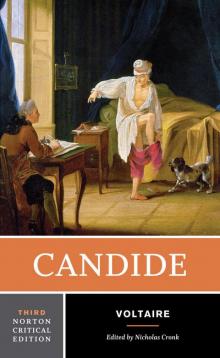 Candide
Candide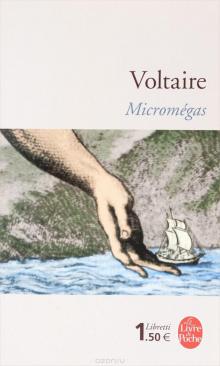 Micromegas
Micromegas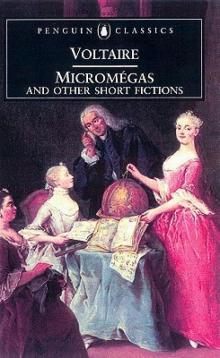 Micromegas and Other Short Fictions (Penguin ed.)
Micromegas and Other Short Fictions (Penguin ed.)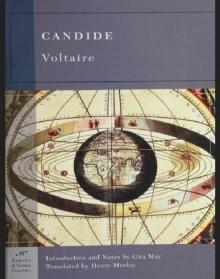 Candide (Barnes & Noble Classics Series)
Candide (Barnes & Noble Classics Series)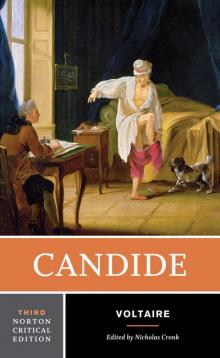 Candide (Third Edition) (Norton Critical Editions)
Candide (Third Edition) (Norton Critical Editions) Zadig or L'Ingenu
Zadig or L'Ingenu